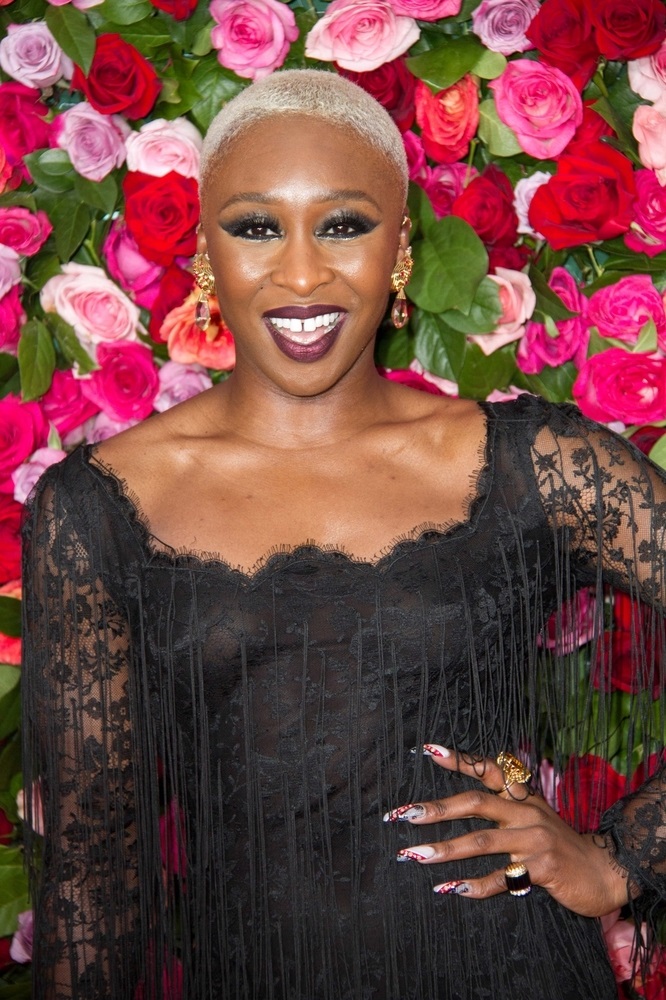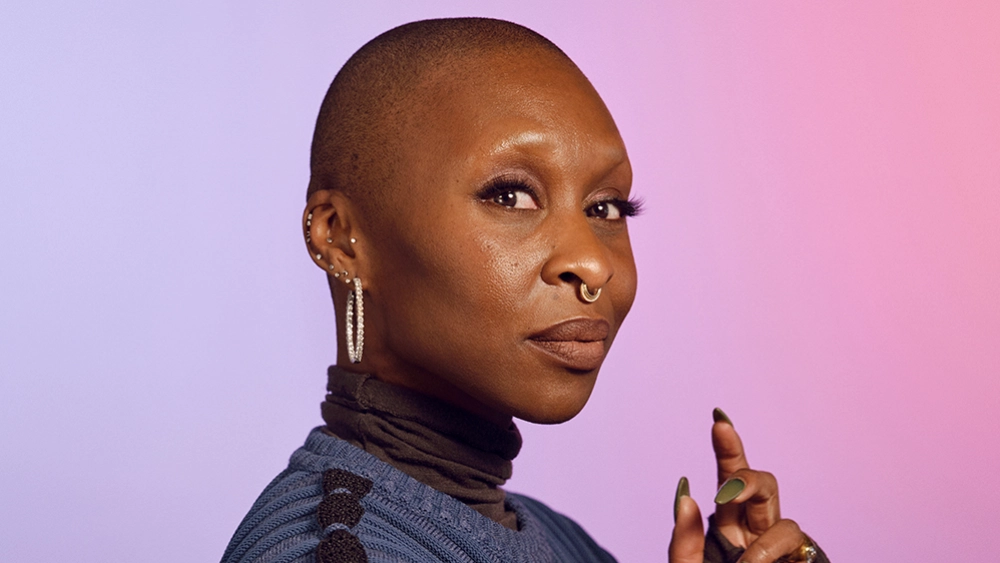Cynthia Erivo's Alopecia: Facing The Challenge, Finding Strength
What does the experience of a renowned performer reveal about hair loss and public perception?
The public acknowledgment of hair loss by a prominent figure like Cynthia Erivo can act as a catalyst for broader discussion surrounding the experience and societal perceptions. Hair loss, and particularly its impact on women and men in public life, can be a deeply personal and isolating issue. The sharing of such an experience by a celebrated individual can increase awareness and potentially reduce the stigma often associated with this condition.
The importance of such public discourse lies in its potential to normalize conversations about hair loss. Increased visibility can challenge stereotypes, fostering empathy and understanding. This can lead to more accessible and supportive resources for those grappling with hair loss issues, potentially reducing feelings of isolation and promoting healthier coping mechanisms. Beyond personal impact, the discussion around hair loss can be valuable from a wider societal perspective, shedding light on systemic issues that affect individuals experiencing hair loss.
Read also:Hdhub4u Movies Best Hd Movies Online
| Attribute | Detail |
|---|---|
| Full Name | Cynthia Erivo |
| Occupation | Singer, actress |
| Notable Roles | (List of significant roles or performances, e.g., "Harriet," "The Color Purple") |
| Public Recognition | Grammy Award winner and prominent figure in entertainment |
The discussion about hair loss in the context of Cynthia Erivo's experience can be a springboard to delve deeper into related topics such as medical treatments for hair loss, diverse perspectives on beauty standards, and the importance of self-acceptance and body positivity. The subject matter is multifaceted and could potentially inspire future research in related disciplines.
Cynthia Erivo's Alopecia
Public figures facing hair loss conditions often spark crucial conversations about societal perceptions and self-acceptance. Cynthia Erivo's experience raises important considerations about alopecia, its impact, and its implications.
- Public awareness
- Stigma reduction
- Emotional impact
- Medical understanding
- Body positivity
- Media portrayal
Cynthia Erivo's case highlights the need for greater public awareness about alopecia. Her visibility can help reduce stigma, encourage open discussions, and improve access to appropriate support. The emotional impact of hair loss is often overlooked, and her experience underscores the importance of understanding this aspect. Her case also emphasizes the need for increased medical understanding, encouraging continued research. The importance of body positivity and the media's role in shaping public perception are directly tied to the wider societal implications of alopecia. For example, if the media showcases diverse portrayals of individuals with alopecia, it could foster a more accepting society, leading to improved emotional well-being for those affected.
1. Public Awareness
Public awareness surrounding alopecia, particularly when exemplified by a prominent figure like Cynthia Erivo, fosters a crucial shift in societal understanding. Increased visibility, achieved through open discussions and media representation, plays a vital role in reducing the stigma often associated with the condition. This increased awareness can lead to a more compassionate and accepting environment for individuals experiencing hair loss. A public figure's willingness to share their experience can act as a catalyst for broader conversations, thereby destigmatizing the condition and encouraging empathy.
The practical significance of heightened public awareness extends beyond emotional support. Increased awareness can potentially improve access to resources and medical interventions. Knowledge about available treatments and support networks can empower individuals experiencing alopecia to seek appropriate care and cope more effectively. Furthermore, increased awareness can influence media representations, potentially leading to a more nuanced and accurate portrayal of individuals with alopecia in films, television, and other forms of media. This, in turn, can reshape public perceptions and contribute to a more inclusive society.
In conclusion, public awareness regarding alopecia, as exemplified by the visibility of figures like Cynthia Erivo, is a critical element in fostering a more accepting and understanding society. While challenges in combating stigma persist, increased awareness can contribute to improved medical access, better support networks, and a more compassionate public discourse surrounding hair loss. The ripple effect of this heightened awareness can positively influence societal attitudes and lead to improved well-being for those impacted by this condition.
Read also:Sun 385 Latest Updates News
2. Stigma Reduction
The public acknowledgment of alopecia by a prominent figure like Cynthia Erivo can serve as a powerful catalyst for reducing the stigma associated with hair loss. This reduction is crucial, impacting the emotional well-being of individuals grappling with this condition and fostering a more inclusive society.
- Increased Visibility and Representation
The visibility of a high-profile individual experiencing alopecia can normalize the condition in the public eye. This exposure counters stereotypes and misconceptions that often lead to feelings of isolation and shame. When prominent figures openly share their experiences, it creates opportunities for broader discussion and understanding, challenging the societal pressures related to appearance and hair health.
- Challenging Societal Beauty Standards
Public figures who embrace their experiences can challenge restrictive beauty standards, highlighting the diversity and acceptance that are crucial in a healthy society. By not conforming to narrow ideals of attractiveness, these figures inspire others to embrace their own unique features, thereby reducing the pressure to conform to a specific aesthetic.
- Empowerment and Self-Acceptance
Openly sharing experiences with alopecia can empower individuals to embrace their identities without shame or fear of judgment. Public figures can demonstrate that strength and confidence are not contingent on appearances, potentially fostering a more supportive environment where self-acceptance precedes societal pressures.
- Promoting Open Dialogue and Understanding
The visibility of alopecia can create an environment conducive to open discussion and empathy. This can encourage individuals to talk openly about their experiences, potentially leading to improved medical understanding, support systems, and the development of more inclusive policies and practices.
In the context of Cynthia Erivo's experience, the reduction of stigma surrounding alopecia through her visibility can lead to a more compassionate and accepting society. It offers hope and support for individuals experiencing hair loss, demonstrating the importance of role models who break down barriers and encourage self-acceptance. Ultimately, this societal shift can result in a healthier and more inclusive environment for everyone.
3. Emotional Impact
The experience of alopecia, particularly when affecting a public figure like Cynthia Erivo, carries significant emotional weight. Hair loss can be deeply personal and psychologically distressing. The impact extends beyond the physical change, often triggering feelings of anxiety, insecurity, and isolation. Public acknowledgment of alopecia, while potentially positive for broader awareness, can also amplify these emotional challenges, demanding strategies for navigating societal pressures and self-acceptance.
The emotional impact of alopecia manifests in various ways. Loss of self-esteem and body image issues are common. Social pressures and expectations related to appearance can exacerbate these feelings. Further complicating matters, individuals with alopecia may face negative perceptions and judgments from others. The emotional toll can significantly impact mental well-being, leading to stress, depression, and potentially social withdrawal. The experience is further complicated when considering the added pressure a public figure like Cynthia Erivo might face regarding maintaining a specific image. Navigating these emotional complexities requires individual coping mechanisms and potentially professional support.
Understanding the profound emotional impact of alopecia is crucial for developing effective support strategies. Such understanding necessitates recognizing that the condition is not merely a physical change but a multifaceted experience encompassing psychological and social dimensions. This awareness allows for a more empathetic approach, recognizing the need for tailored support systems. Furthermore, by acknowledging the emotional turmoil involved, individuals can better equip themselves to address the challenges and find pathways to manage their experience healthily. This awareness is particularly vital for public figures, demanding strategies that integrate support for their emotional well-being alongside their public persona.
4. Medical Understanding
Medical understanding of alopecia, in the context of a public figure like Cynthia Erivo, is crucial for nuanced public discourse and effective support. The specific condition experienced by an individual influences the appropriate medical approach. Accurate diagnosis, tailored treatment, and understanding the potential impact on overall health become paramount.
- Diagnostic Precision
Accurate diagnosis is essential. Alopecia presents with diverse forms, each requiring a distinct approach. Misdiagnosis can hinder appropriate treatment and impact overall well-being. Precise identification of the type of alopecia, whether autoimmune, scarring, or another form, is fundamental to effective management.
- Treatment Efficacy and Options
Understanding the effectiveness of various treatments for alopecia is critical. Research into different therapies, including topical medications, medications, and potentially surgical procedures, informs treatment strategies. The choice of treatment must consider the specific type of alopecia and individual patient characteristics. Furthermore, potential side effects and long-term consequences need to be considered in planning treatment regimens. Different types of alopecia respond differently to treatment. For instance, topical minoxidil may be effective for androgenetic alopecia but may not be suitable for alopecia areata.
- Impact on Overall Health
Alopecia can significantly impact an individual's overall health. The condition might be a manifestation of an underlying health issue, potentially impacting systemic function. Comprehensive medical evaluations, encompassing a range of physical and emotional considerations, are necessary. Furthermore, the psychological effects of hair loss, including anxiety, depression, and social isolation, must be acknowledged and managed as part of the treatment plan.
- Research and Advancement
Continued research into the causes and treatments of alopecia is paramount. Advances in understanding the underlying mechanisms of the condition contribute to developing more targeted interventions and improving patient outcomes. This research can provide insights into new diagnostic tools, potentially leading to more accurate diagnoses and earlier interventions.
In the case of Cynthia Erivo, a clear understanding of the specifics of her condition allows for informed discussion of both treatment options and potential impact on her overall well-being. Public discourse, informed by accurate medical information, promotes responsible conversations about alopecia and the need for appropriate healthcare. Furthermore, this understanding can help foster more inclusive and supportive environments for individuals experiencing hair loss. The increased awareness surrounding Cynthia Erivo's alopecia, coupled with a more comprehensive medical understanding, can help others access the care they need.
5. Body Positivity
Body positivity, a concept emphasizing the acceptance and celebration of all body types, is intrinsically linked to the experience of alopecia, particularly when considering a public figure like Cynthia Erivo. The concept's relevance lies in its ability to counteract societal pressures to conform to idealized beauty standards and promote self-acceptance, which is crucial for navigating the emotional complexities of hair loss.
- Challenging Beauty Standards
Body positivity directly challenges the narrow, often unattainable, beauty standards prevalent in society. By promoting the idea that all body types are valid and worthy of respect, this philosophy fosters a sense of belonging for individuals experiencing alopecia. This challenge to conventional beauty norms is vital in countering the negative self-perception that can arise from perceived deviations from an idealized standard. In the context of alopecia, this translates into recognizing that hair loss does not diminish an individual's worth or attractiveness.
- Empowering Self-Acceptance
Body positivity empowers individuals to accept their bodies and their experiences, including alopecia, without judgment or shame. This approach emphasizes embracing individual differences and celebrating the uniqueness of each person. For those experiencing hair loss, this empowerment is crucial in building self-esteem and confidence. It allows individuals to focus on their inherent worth rather than fixating on perceived flaws.
- Promoting Inclusive Representation
Body positivity often emphasizes the importance of diverse representations in media and popular culture. By showcasing a range of body types and experiences, including hair loss, the concept fosters a sense of belonging and validation for those affected by alopecia. Such representation reduces the isolating impact of the condition by showcasing the diversity of human experience. The inclusion of alopecia within body positive messaging can inspire greater empathy and reduce stigma.
- Developing Resilience and Self-Care
The journey of accepting a body with alopecia often involves developing resilience and healthy coping mechanisms. Body positivity fosters self-care practices that prioritize emotional well-being and promote a positive outlook on the experience. This approach recognizes that self-acceptance is a continuous process, requiring ongoing work and support. It enables individuals to view their bodies with compassion and understanding, developing strategies for managing their emotions and experiences.
In essence, the concept of body positivity provides a framework for addressing the emotional impact of alopecia on individuals. By challenging traditional beauty ideals, empowering self-acceptance, promoting inclusive representation, and developing resilience, body positivity offers a vital pathway to navigating the challenges of hair loss and fostering a more inclusive society.
6. Media Portrayal
Media portrayal significantly influences public perception of alopecia, particularly when a prominent figure like Cynthia Erivo experiences it. The manner in which media depicts individuals with hair loss conditions can either reinforce harmful stereotypes or promote understanding and empathy. The portrayal of alopecia directly impacts how individuals perceive and react to the condition, both personally and on a societal level.
Consider how media representations shape public understanding. If media predominantly portrays individuals with hair loss as victims or objects of pity, a negative association might persist. Conversely, if media showcases diverse and empowered representations, highlighting resilience and self-acceptance, the public response might be more positive and nuanced. The absence of visible representation of alopecia in media perpetuates the lack of understanding and reinforces its stigmatization. A positive portrayal, showcasing individuals like Cynthia Erivo with alopecia in a confident and empowered manner, can contribute significantly to reducing stigma.
The media's role extends beyond simply depicting a condition. How media handles the narrative of alopecia significantly affects the emotional response and societal perception. If the focus remains on pity or the perceived deficiency caused by hair loss, a negative image persists. Conversely, if the story emphasizes resilience, self-acceptance, and the strength of the individual, the societal impact shifts. Effective portrayal acknowledges the complexities of the condition without resorting to simplistic narratives. Examples of media portraying alopecia positively can be few and far between; careful consideration of such portrayals is critical to fostering a more understanding and inclusive society.
Understanding the connection between media portrayal and Cynthia Erivo's experience with alopecia is vital for promoting accurate and empathetic public discourse. Positive and inclusive media representations foster understanding and reduce the negative stigma often associated with the condition. This understanding has practical implications for individuals experiencing alopecia and for shaping a more tolerant and supportive society. The media's influence on how alopecia is perceived is substantial. Therefore, thoughtful and nuanced portrayals are critical for promoting a more accurate and empathetic societal response.
Frequently Asked Questions about Cynthia Erivo and Alopecia
This section addresses common questions and concerns surrounding Cynthia Erivo's experience with alopecia. The information provided is based on publicly available data and expert sources. It's important to remember that each individual's experience with alopecia is unique.
Question 1: What is alopecia?
Alopecia is a general term for hair loss. There are various types, including alopecia areata, androgenetic alopecia, and others, each with distinct causes and treatment approaches. Identifying the specific type of alopecia is crucial for effective management.
Question 2: How does alopecia affect public figures like Cynthia Erivo?
Public figures face heightened scrutiny, and alopecia can amplify existing pressures related to appearance. The condition can evoke diverse reactions, from empathy to judgment. Openly addressing alopecia can foster public awareness and reduce stigma, while maintaining privacy and personal boundaries remains important.
Question 3: Can alopecia be treated?
Treatment options vary depending on the type of alopecia. There isn't one universally effective approach. Individuals should consult healthcare professionals for diagnosis and appropriate guidance on available therapies. The success of treatment can depend on several factors, and patients should discuss potential benefits and risks with medical experts.
Question 4: What is the impact of media portrayal of alopecia?
Media portrayal significantly shapes public perception. Representations that reinforce negative stereotypes can perpetuate stigma. Conversely, positive and inclusive portrayals can foster empathy and reduce the negative impact on individuals experiencing hair loss. Thoughtful and nuanced media depictions are crucial for a more informed public discourse.
Question 5: How can individuals support those experiencing alopecia?
Supporting individuals with alopecia involves empathy, understanding, and respect. Avoid generalizations and preconceptions. Encouraging open dialogue and promoting self-acceptance are key. Seeking professional guidance for further support and appropriate resources is often beneficial.
In conclusion, understanding alopecia and its effects on individuals, including public figures, requires sensitivity, accurate information, and a commitment to reducing stigma. Individual experiences are diverse, and appropriate support involves personalized care and ongoing understanding.
This concludes the FAQ section. The next section explores the broader societal implications of alopecia.
Conclusion
The case of Cynthia Erivo and her experience with alopecia highlights a complex interplay of societal factors, medical considerations, and personal resilience. This exploration underscores the significant emotional impact of hair loss, particularly for public figures subject to intense scrutiny. Key elements revealed the need for increased public awareness to reduce the stigma often associated with alopecia. Accurate medical understanding and accessible treatment options are vital for effective management. The importance of body positivity, challenging conventional beauty standards, and media representation fostering inclusivity, were also evident. The experience further emphasizes the need for more nuanced and comprehensive support systems for individuals facing hair loss.
Ultimately, the story of Cynthia Erivo and alopecia serves as a potent reminder of the need for a more compassionate and understanding society. The impact extends beyond individual experience, prompting a critical examination of beauty standards, media representation, and the systemic challenges faced by those navigating conditions such as alopecia. Moving forward, fostering a more inclusive environment demands a collective commitment to challenging biases and promoting empathy, understanding, and access to resources. The ongoing conversation spurred by such experiences is crucial for dismantling harmful stereotypes and promoting a truly equitable and supportive community.


